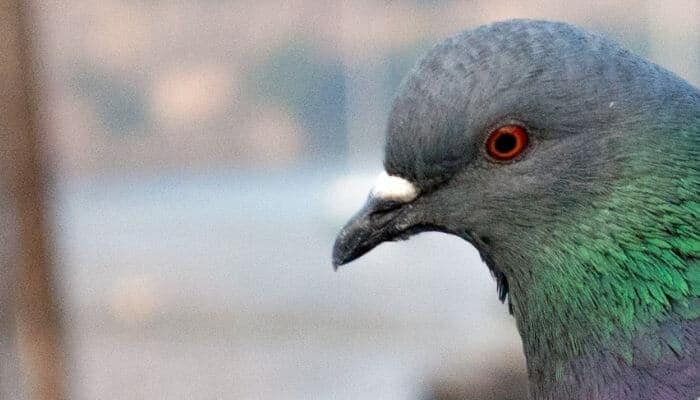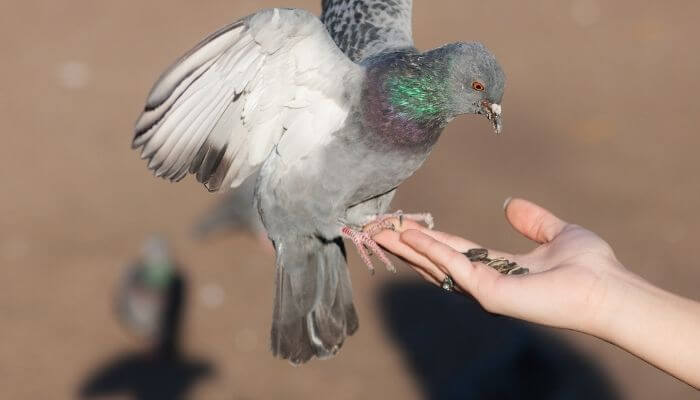Even though they would probably eat them if given to them, it is not advisable to feed lentils to your pigeons.
Pigeon fanciers, however, seem to be somewhat divided on this issue.
What are Lentils?
Lentils are legumes. Legumes are mostly plants that grow in pods that split evenly in half and are filled with edible beans or seeds. It is rare to eat the pod – just what’s found inside.
Most legumes – if they aren’t beans – are referred to as pulses.
Like most pulses, lentils are typically sold dried.

There are various varieties of lentil – actually four main:
- Brown lentils
- Green lentils
- Red/yellow lentils
- Speciality lentils
- Black beluga lentils
- Puy lentils
They are highly nutritious and are excellent sources of protein and fibre.
So, they might be one of the most popular forms of vegetable protein around the world but are they good for pigeons?
The Pigeon Diet
Prima facie, it would appear that lentils slot nicely into what a pigeon eats. The average pigeon diet, whether the bird is feral or domesticated, consists of a mix of seeds, grains, grasses, nuts and berries.
A feral pigeon will supplement with anything they can find that is edible – especially urban pigeons who love to feast on discarded human food. Domesticated pigeons rely on their owner for food and as well as filling up the bird feeders with a decent mix, they may also supplement with fruit such as bananas or mealworms.
Pulses are essentially a seed. They’ve been around for 8,000 years and are easily cultivated and readily available. They are a nutritional powerhouse packed with a variety of nutrients, minerals and vitamins that a pigeon needs.
Lentils are a good source of carbohydrates, protein, fats, iron, fibre, sodium, folate, calcium and potassium, all of which need to be included in a pigeon’s diet.
Many birds enjoy lentils, so why do some fanciers not recommend lentils for pigeons?
Why Should Pigeons Not Eat Lentils?
The main reason is a simple, physical one. On the spectrum of seeds and grains, lentils are on the larger side of the scale.
Some people believe that dry lentils are too big for the digestive system of a pigeon and are a choking hazard.
Food is first passed into the crop which is large enough to accept big lentils but the passage which takes the food to the gizzard where it is ground up for digestion is the proventriculus.
This is very narrow, and a lentil can block it.

There is another highly scientific reason why you may want to avoid feeding lentils to pigeons.
Lentils contain a protein called hemagglutinin. It is the presence of this protein that is responsible for the advice to humans that legumes should be first soaked and then cooked at very high temperatures to make them safe to eat.
Untreated, hemagglutinin is toxic. If the pulses are not prepared correctly, they can cause nausea, vomiting and dizziness.
The consumption of too many pulses – even if treated properly – can cause gas and bloating.
You don’t want to see any of these side effects of hemagglutinin in your pigeons.
Another thing a pigeon owner should know is that there is a link between bird flu and hemagglutinin.
Hemagglutinin is known to aid viruses to attach to cells. The issue is very complex but that there is a link to bird flu should be of sufficient concern to any bird owner and pigeon fancier.
It is unlikely to be as much of a problem to feral pigeons as it is unlikely that they would go to the bother of pecking through pods to reach the lentils within.
Be Careful of Your Seed Mixes
Though we personally don’t think that lentils are a good idea for pigeons, the awkward thing is that not all parties involved in pigeon food products agree.

When you visit the pet store, you will find that a number of cheaper seed mixes do contain lentils and other pulses.
Any pigeon will happily tuck into a mix like this and won’t realize that they are struggling with the lentils until later.
To avoid this problem altogether, we suggest paying some extra attention to the ingredient lists on the mixes that you buy to ensure that you aren’t wasting your money on a significant amount of lentils.
Always check the ingredient list remembering that those with the highest proportion in the content are listed first.
Conclusion
The bottom line is that pigeons should not generally be given the option to eat lentils, especially in a domestic setting where owners are able to dictate nearly all of what they eat.
Pigeons are opportunistic feeders and will have a peck at pretty much anything, so make sure that lentils are not available.
